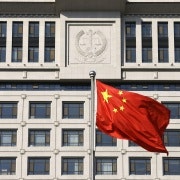There's a catch to Xi's tiger trap
A cardinal rule in politics is to under-promise and over-deliver. When Xi Jinping late last year, on becoming Communist Party of China general secretary, announced (yet another) crackdown on corruption, he raised the bar by declaring that it would not be enough to “swat flies” but “tigers” also had to be caught. In doing so, he immediately raised expectations which he seemed in danger of disappointing.
Last week’s sensational announcement that Liu Tienan was under investigation for corruption may now have changed all that. In March, Liu was removed from his post as director of the National Energy Agency in the all-powerful National Development and Reform Commission – but continued on as an NDRC vice chairman.
He is now in the hands of the Party’s Central Commission for Discipline Inspection – the internal, secretive, anti-corruption watchdog. Liu is accused of embezzling some $US200 million. As is often the case in China with corrupt officials, it seems that a jilted lover exposed him.
The case is especially fascinating for the way it came about. Late last year, Luo Changping, deputy editor-in-chief of China’s leading independent business magazine, Caijing, accused Liu of corruption on his personal Weibo blog (China’s Twitter).
The allegations made against such a senior official were startling for their boldness and directness. Not surprisingly, the posting went viral on China’s blogosphere. Immediately, the NDRC rejected the allegations (odd in itself as it is not for the NDRC to do so on behalf of its senior officials) followed some days later by an official Xinhua News Agency report refuting the allegations as slander.
The story seemingly faded away until March this year when Liu was suddenly removed as director of the NEA. Then last week he was removed from all positions.
The time that has elapsed since the allegations were first made, the initial official denial, and then the start of the process leading to his formal charging suggests that his case may well have been hard fought over behind the scenes at senior party levels.
It is also difficult to believe that a Caijing deputy editor would have used his own personal blog without senior approval within Caijing and beyond that to senior levels of the Party.
It is known that Caijng enjoys considerable support from Politburo Standing Committee member Wang Qishan, who is also responsible for the current anti-corruption campaign. Accusing Liu on Weibo in this way may have been part of an orchestrated plan by Wang to move against him even though he was still protected by powerful senior comrades. Liu is widely seen as having the support of former prime minister Li Peng, whose family plays a dominant role in China’s energy sector.
It now looks as if free-wheeling bloggers have been joined on Weibo by senior officials seeking to advance certain policy objectives. Rather than an example of “wei-governance” – in the latest buzzword doing the rounds referring to officials being held accountable by netizens’ blogging – Weibo may also now be a tool in intra-party struggles.
Official media have now all fallen in behind the accusers, publishing stories about Liu’s ex-lover residing in Japan, accounts of Liu approving some 50 energy projects in his last weeks in the job, and the involvement of Liu’s wife and son with the company that is supposed to have been the recipient of the illegally obtained $US200 million benefit.
This is a high-profile case. The politics may also involve high stakes. But it will take more than this for President Xi to meet the expectations he has raised. Liu is being referred to as a “small tiger”. People are waiting for big tigers to be caught.
Meanwhile, bloggers will now be emboldened in outing wrongdoers. Of course, the innocent can and most likely will be caught up as well.
Xi Jinping’s anti-corruption and Party austerity campaigns are already having a noticeable impact on luxury consumption. Sales of everything from high-end watches to handbags have fallen. Beijing’s 'gangster restaurants', where officials would be lavishly entertained, are now offering cut-price menus and lunchtime buffets. Sales of Moutai – the high-priced, fiery white spirit – have fallen by a quarter this year and the share prices of white spirit producers are all down.
But no one really knows – in Churchill’s famous phrase – if this is the beginning of the beginning, or the beginning of the end of Xi’s campaign against corruption. Xi will need to be careful not to be trapped between popular expectations and powerful entrenched internal resistance from within the Party’s most senior levels.
Geoff Raby is chairman and CEO of Beijing-based advisory firm Geoff Raby & Associates, and a former Australian ambassador to China. He is vice chairman of Macquarie Group China and a Vice Chancellor's Professorial Fellow at Monash University.
















